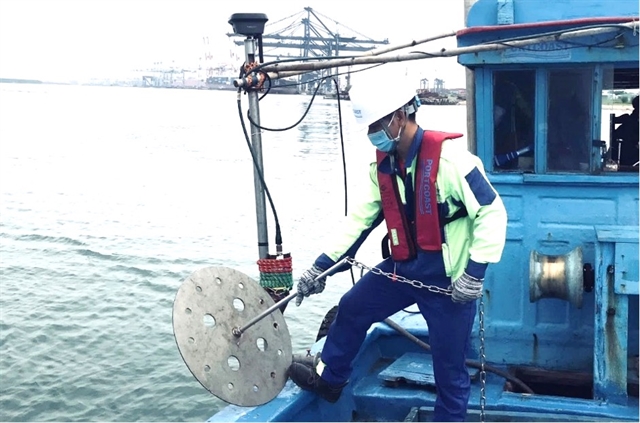HCM City applies 3D technology for waterway management
Society – Economy - Ngày đăng : 20:27, 20/06/2024
 |
| A man checking the speed of sound waves. — Photo courtesy of the HCM City Department of Transport |
HCM CITY — HCM City has completed the application of BIM - GIS, a 3D technology for management work on all 82 waterways, with a total investment of more than VNĐ11.3 billion (US$443,710).
The Management Centre of Waterway Systems under the city’s Department of Transport has deployed the application of 3D point cloud and 3D mesh models to the inland waterway survey for management work.
The centre has completed digitising all waterways, with a total length of more than 522.8 km.
The total area underwater is 5,557ha, while the total area of the two sides of the shore is more than 8,880ha.
The city has applied the technology in 223 river-crossing projects, 146 inland waterway ports and wharves, and undertaken landscape planning on both sides of the rivers.
The technology applied to existing waterway embankment infrastructure can determine the elevation and centre line of the embankment.
It can determine the location coordinates of the river-crossing projects, including width, length, navigation compartment and anti-collision pillars.
For bridge projects, the lowest beam elevation and smallest span can be determined to serve the assessment of the size of the fairway according to the actual technical level.
Port and wharf projects on local inland waterways can update their location, scale, structure, VN-2000 coordinates and routes.
According to the municipal Department of Transport, the application of technology aims to digitise survey data results and integrate them into the city's inland waterway management information system, serving the management, notification and exploitation of inland waterways in the city.
The survey results serve the issuance of traffic notices for management work, and provide information and instructions to crew members, vehicle drivers and relevant organisations and individuals to ensure traffic safety.
They also serve as a basis for building investment plans, and upgrading and maintaining works of inland waterway infrastructure in a reasonable and synchronous manner. — VNS
